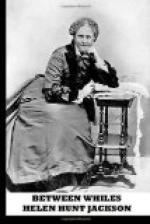The Inn of the Golden Pear.
I.
Who buys? Who buys? ’Tis
like a market-fair;
The hubbub rises deafening on the air:
The children spend their honest money
there;
The knaves prowl out like foxes from a
lair.
Who buys? Who sells? Alas, and
still alas!
The children sell their diamond stones
for glass;
The knaves their worthless stones for
diamonds pass.
He laughs who buys; he laughs who sells.
Alas!
In the days when New England was only a group of thinly settled wildernesses called “provinces,” there was something almost like the old feudal tenure of lands there, and a relation between the rich land-owner and his tenants which had many features in common with those of the relation between margraves and vassals in the days of Charlemagne.
Far up in the North, near the Canada line, there lived at that time an eccentric old man, whose name is still to be found here and there on the tattered parchments, written “Willan Blaycke, Gentleman.”
Tradition occupies itself a good deal with Willan Blaycke, and does not give his misdemeanors the go-by as it might have done if he had been either a poorer or a less clever man. Why he had crossed the seas and cast in his lot with the pious Puritans, nobody knew; it was certainly not because of sympathy with their God-reverencing faith and God-fearing lives, nor from any liking for hardships or simplicity of habits. He had gold enough, the stories say, to have bought all the land from the St. Johns to the Connecticut if he had pleased; and he had servants and horses and attire such as no governor in all the provinces could boast. He built himself a fine house out of stone, and the life he led in it was a scandal and a byword everywhere. For all that, there was not a man to be found who had not a good word to say for Willan Blaycke, and not a woman who did not look pleased and smile if he so much as spoke to her. He was generous, with a generosity so princely that there were many who said that he had no doubt come of some royal house. He gave away a farm to-day, and another to-morrow, and thought nothing of it; and when tenants came to him pleading that they were unable to pay their rent, he was never known to haggle or insist.
Naturally, with such ways as these he made havoc of his estates, vast as they were, and grew less and less rich year by year. However, there was enough of his land to last several generations out; and if he had married a decent woman for his wife, his posterity need never have complained of him. But this was what Willan Blaycke did,—and it is as much a mystery now as it doubtless was then, why he did it,—he married Jeanne Dubois, the daughter of a low-bred and evil-disposed Frenchman who kept a small inn on the Canadian frontier. Jeanne had a handsome but wicked face. She stood always




